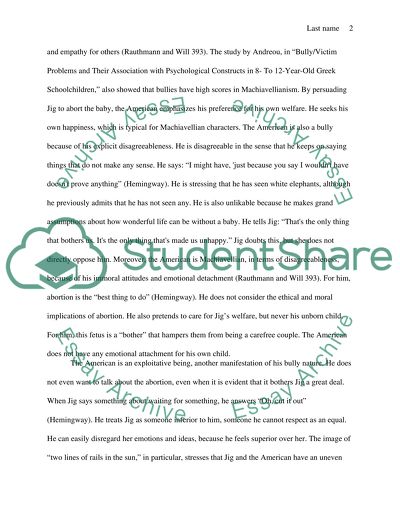Cite this document
(“Hills like White Elephants: Thesis: The character of Jig is clearly Research Paper”, n.d.)
Retrieved from https://studentshare.org/english/1593372-hills-like-white-elephants-thesis-the-character-of-jig-is-clearly-suffering-from-abuse-at-the-hands-of-the-american-and-thusly-exhibits-diminished-self-esteem-which-can-be-evidenced-in-her-behavior-throughout-the-story
Retrieved from https://studentshare.org/english/1593372-hills-like-white-elephants-thesis-the-character-of-jig-is-clearly-suffering-from-abuse-at-the-hands-of-the-american-and-thusly-exhibits-diminished-self-esteem-which-can-be-evidenced-in-her-behavior-throughout-the-story
(Hills Like White Elephants: Thesis: The Character of Jig Is Clearly Research Paper)
https://studentshare.org/english/1593372-hills-like-white-elephants-thesis-the-character-of-jig-is-clearly-suffering-from-abuse-at-the-hands-of-the-american-and-thusly-exhibits-diminished-self-esteem-which-can-be-evidenced-in-her-behavior-throughout-the-story.
https://studentshare.org/english/1593372-hills-like-white-elephants-thesis-the-character-of-jig-is-clearly-suffering-from-abuse-at-the-hands-of-the-american-and-thusly-exhibits-diminished-self-esteem-which-can-be-evidenced-in-her-behavior-throughout-the-story.
“Hills Like White Elephants: Thesis: The Character of Jig Is Clearly Research Paper”, n.d. https://studentshare.org/english/1593372-hills-like-white-elephants-thesis-the-character-of-jig-is-clearly-suffering-from-abuse-at-the-hands-of-the-american-and-thusly-exhibits-diminished-self-esteem-which-can-be-evidenced-in-her-behavior-throughout-the-story.


